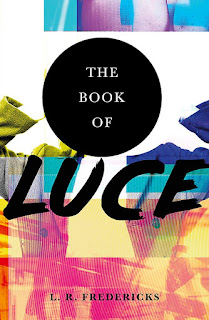The Book of Luce - L. R. Fredericks
As someone who has fallen under the spell of both Farundell and Fate, and who has been monitoring the changing publication dates for Frederick's third novel in the series over the last couple of years with feverish anticipation, being offered a preview copy of The Book of Luce feels somewhat akin to the experience described by the narrator of the book on their discovery of the enigmatic music artist Luce. In 1967, when LSD experimentation, Eastern mysticism and interest in the occult are all the rage, a series of obscure clues leads the author to an underground venue in Camden where a select audience witness the mind-expanding, conscious-altering experience of Luce and the Photons.
It's a secret gig that seems to only be offered to those who are not only capable of deciphering the obscure clues that are given, but who are clearly deemed willing to be open to the important message that the enigmatic and androgynous Luce seems to want to impart to the world. The author, a music journalist who writes under the pseudonym Chimera Obscura, is determined to solve the clues left in the sleeve art on the rare copies of Luce and the Photon's debut 'Human' album, and takes a trail that is as much astral as physical, as much esoteric as exotic. On a journey that takes in the Nevada desert, Kathmandu and Paris, the narrator encounters others who have been touched by the artistic light of Luce and inspired to realise their own potential.
The more that Chimera manages to find out about the background of Luce's family and early life tends to enhance rather than dissolve the mystery of who he/she is. Part of the reason is that her artistic creations and musical pieces are somewhat difficult to pin down and ephemeral, having a tendency to be destroyed by mysterious fires soon after the author finds them. The reason for all the secrecy and mystery is however clearly related to their destruction, the author encountering strange demonic figures that seem to be pursuing Luce and trying to prevent her from delivering the almost messianic or Gnostic message of salvation that Luce seems to have for the world.
The Book of Luce is as different in style as the 18th century gothic adventures in Fate were to the post- Great War coming-of-age eroticism and spiritual awakening of Farundell, and figures from both those books - notably Paul Asher and Francis 'Frankie' Damory - crop up in The Book of Luce. While it contributes further to the non-linear exploration and elaboration of connecting of ancient beliefs to the expansion of human experience and consciousness that the author has developed across these three books, The Book of Luce can easily be read and enjoyed on its own terms, and may even be the most accessible entry point into this world view established by L.R. Fredericks.
Being more accessible and closer to the present day however has its drawbacks as well as advantages. It can certainly be related more closely to the same kind of synchronicitous interconnected layering of mysticism that you will find in David Mitchell's elaborate fictions, but there is also a delightful sense of humour here that is reminiscent of Robert Irwin's surreal altered-world psychedelic trips of paranoia and Eastern mysticism, particularly his hilarious Satan Wants Me. At times however, Chimera Obscura's pop and counter-culture world views and strange encounters with astral projections and evil entities do come across as rather hokey without any distinctive insight or character of their own. There's little of the creative treatment of these elements that you would find, for example, in the works of Haruki Murakami or in Stockhausen (who believed himself to be an emissary of the Light) in his epic 7-day cycle of operas 'Licht' (meaning 'Light' of course, as does Luce).
There's a sense also that where Farundell and Fate were content to retain an intriguing air of ambiguity in their esoteric world views, The Book of Luce attempts to explain too much. On the other hand, we have to remember that The Book of Luce is a book within a book, written by an author under a pseudonym Chimera Obscura, who has demonstrated that they have a talent for sowing misinformation and have good reason for doing so. Perhaps then the book is just another effort at distraction from the truth, while at the same time leaving clues to a new path that those of a more open mind might just pick up. Such is the nature of the cult of L.R. Frederick's 'Time and Light' series, and if it doesn't expand you mind to new possibilities, you'll at least find it an enjoyable romp though some old ones. Assuming, of course, that all existing copies of The Book of Luce aren't mysteriously destroyed in a fire before publication...
The Book of Luce by L. R. Fredericks is published by Hodder & Stoughton on 10th August 2017.




Comments
Post a Comment